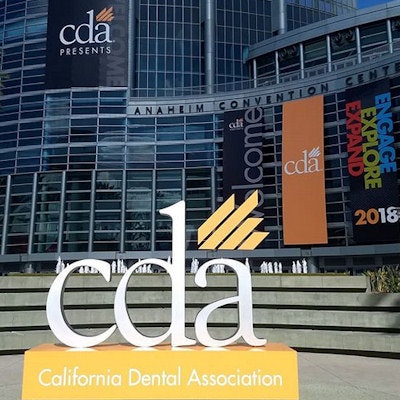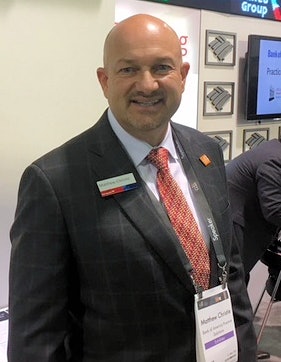
ANAHEIM, CA - You do your research and learn that two nearby practices are going to become available for acquisition. This is your chance to own multiple practices. But what does it take to get funding for these acquisitions? In a presentation on Friday at the California Dental Association's CDA Presents 2018 meeting, Matthew Christie of Bank of America discussed five aspects that banks consider for practice acquisition loans.
Christie, a vice president and regional sales manager for the Practice Solutions Division for Bank of America in Irvine, CA, told DrBicuspid.com that dentists generally come to him asking if a bank is willing to loan them the money for a second or third location, despite their existing student loan or practice debt.
"They ask me if the bank will make a loan for a second location," he said. "They are concerned about student loan debt or existing practice debt."
What the bank asks about
 Matthew Christie is the vice president and regional sales manager in the Practice Solutions Division for Bank of America.
Matthew Christie is the vice president and regional sales manager in the Practice Solutions Division for Bank of America.Any small business, especially a dental practice, needs business capital to be able to expand, Christie said. While this might seem basic, it takes more than just noticing an opportunity to get a bank to give a loan. He listed five areas a bank will ask practice owners about when they are looking to become a multipractice owner:
- Financial hygiene of a practice
- Having an expansion plan
- Ownership and structure
- Ratios
- Personal financial statement
1. Financial hygiene
Christie compared financial hygiene to the conversations a dentist has with patients to maintain good oral hygiene habits. Banks like to see that practices have accurate and up-to-date financial records. Having current financial records also can help a practice avoid fraud, embezzlement, or wasteful financial practices, he noted.
Christie recommends that practice owners considering new acquisitions have a certified public accountant compile a practice's financial statements on a quarterly basis and also file the practice's tax returns.
2. Expansion plan
His second point was that the dentist seeking the loan needs to have a plan in place. There are, generally, two growth models, he noted. The first is a plan to open multiple locations with similar facilities and duplicable operational functions. Any bank is going to want to see a well-devised plan for location demographics, facility size, staffing, equipment, and building costs.
The other potential growth model is acquisitions. With this strategy, the bank needs to see a thorough evaluation of the target practice. Interestingly, banks usually also want to see a plan for accommodating a retiring owner and for how that dentistry will be replaced.
This leads to one of Christie's key points: The multipractice owner can't do all the dentistry.
3. Ownership and structure
Christie's third item is about how the dentist organizes the corporate structure for multipractice ownership. Rather than endorse one model over another, he emphasized that banks usually seek consistency in the model.
He also suggested that having a corporate plan established by a dental-specific attorney who understands the intricacies of multipractice ownership is a good idea.
4. Ratios
Christie also offered some practical advice on two ratios bank analysts will consider before approving a loan: loan to collections and debt to income.
Loan to collections is the ratio of the revenue a practice is currently collecting plus the amount the target practice is collecting. This sum is then divided by the amount of debt a practice is carrying plus the new debt needed to complete the acquisition.
Debt to income is the ratio of practice profits to the amount of loan payments.
5. Personal finance
One aspect of a business loan application that surprises some dentists is that banks will also examine a dentist's personal financial situation. Christie recommends maintaining a personal credit score of 700 or higher and having a strong personal financial statement. Banks expect that the practice owner has the ability to step in and support the business if there is an emergency, he noted.
Christie was asked what he hoped dentists attending his presentation would come away with.
"I want them to have a realistic view of what it takes from a financial perspective to qualify for their next practice and to qualify with additional practices beyond that," he responded.
Disclaimer: The comments in this article are not meant to be taken as financial advice. DrBicuspid.com recommends that you always consult with a financial professional before making any significant changes in your financial situation.
















